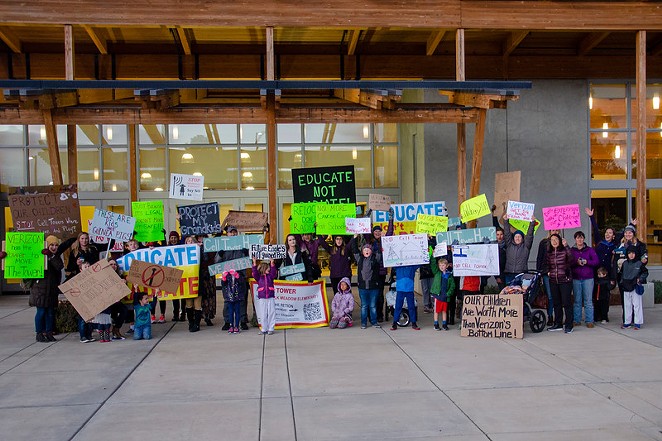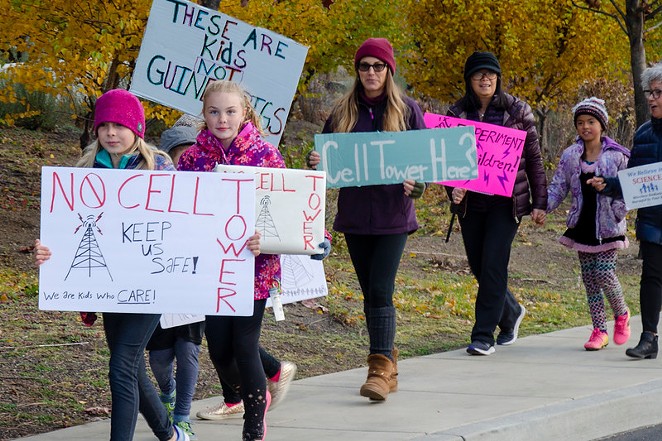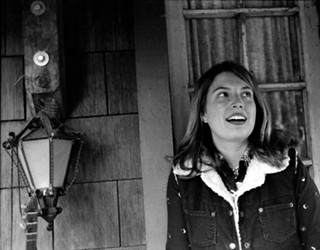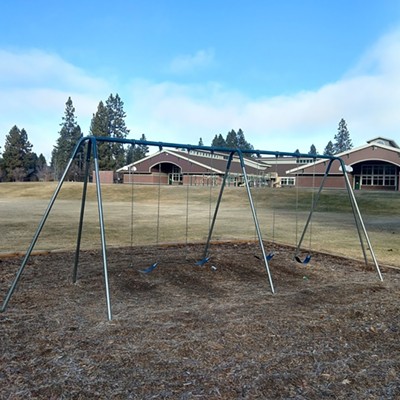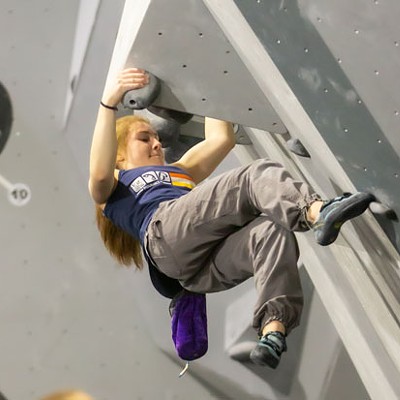The group recently sent a letter to Verizon's lawyer, and included in their letter 36 scientific studies about the dangers of radio frequency radiation from cell towers. Now the group seems to have an ally in Bend City Councilor Chris Piper, who's pushing the issue with Oregon's congressional delegation in Washington, D.C., and has drafted a letter on behalf of the City to the Federal Communications Commission, which will come before City Council Dec. 4.
A town hall, and a demonstration
Between 60 and 70 members of the organization “Stop Cell Towers at Schools” demonstrated outside of the Bend Park & Recreation District office building before a Verizon town hall Meeting on Oct. 17, carrying colorful signs with slogans like “Educate don’t radiate,” and “These kids are not guinea pigs.”
To date, the group has collected 1,746 signatures from concerned citizens insisting that Verizon move the tower at least 1,300 feet away from the school because of the potential health risks associated with RF radiation.
“In addition to multiple forms of cancer, we are also concerned with the possible neurological effects,” said Elizabeth Hanley Szabo, who has two children at Elk Meadow Elementary. “These range from memory and attention problems to headaches, insomnia and depression. Is this really what we want to expose our children to?”
In early October, Szabo, Paul Bacon and Jeannelle Sylvester hand delivered the petition to Colleen DeShazer, network engineering manager for Verizon, who happened to be in Bend for a conference at the Riverhouse Convention Center that day.
DeShazer agreed to host a town hall meeting in Bend to address any ongoing concerns about RF radiation and children’s health. She announced the meeting Oct. 14, three days before the event was scheduled. On the evening of the event, Donna Barrett, Verizon’s lawyer came from Portland, and Dr. Jarrold Bushberg flew in from California. Bushberg works in the Radiation Oncology Department at UC Davis and has worked as a paid consultant for the Cellular Telecommunications Industry Association in the past, according to a July 31, 2000 article in RCR Wireless.
“It was his job to defend Verizon’s position to put the tower there,” said Bacon, who has two children at Elk Meadow Elementary. “He wasn’t unbiased, there were a lot of people that were upset.”
"I wanted to help create a clear path for parents to activate democracy, and provide the right connections for them so that they could be heard and we could get something changed."-City Councilor Chris Piper
tweet this
“The general consensus after the two-hour meeting was that nobody felt convinced either way,” said Christine Meyers, another member of SCTS. “Cell towers have electromagnetic fields of radio frequencies that have cumulative effects. Bushberg did validate that the science is inconclusive and still developing.”
Bacon gathered 110 studies about the health risks of RF radiation and presented some of these to Bushberg at the meeting. Bacon later whittled the collection down to 36 studies which he sent to Barrett, Verizon’s lawyer, by certified mail on November 12.
“We appreciate that you allowed us to put questions to Dr. Bushberg at the town hall meeting,” Bacon wrote. “Unfortunately, that brief exchange only scratched the surface of an extremely complex and critical issue. Increasing numbers of studies point to previously unrecognized hazards of long-term exposure to cell tower radiation… studies from reputable sources, such as the U.S. National Institutes of Health.”
For Bacon, the goal is to maintain an open dialogue with Verizon and see if they have equally strong scientific evidence to argue the case that the tower will not pose any long-term danger to the children at Elk Meadow Elementary.
Concerned parents
SCTS first approached the City to protest the tower at the Sept. 30 City Council meeting. City leaders researched ways they could help the group, but discovered that because wireless communications infrastructure is regulated by the Federal Communications Commission, their hands were tied. When parents and students from SCTS again flooded City Hall on Oct. 2, Mayor Sally Russell explained that the City had followed required protocol for planned construction back in the fall of 2017 when they first approved the building permit. The City alerted people who lived within 750 feet of the tower, as well as informing the SW Bend Neighborhood Association and the Bend-La Pine School District.
That evening, dozens of parents and students addressed City Council, demanding that councilors either repeal the permit they granted to Verizon in October of 2017, or failing that, contact Verizon directly to try to stop the continued construction of the tower.
Szabo believes that one of the difficulties of this situation is that new technologies are developing at such a rapid rate that the FCC regulations can’t keep pace.
Councilor Chris Piper said he was not comfortable accepting that “nothing” could be done at the city-level to help his constituents, so he called U.S. Senators Jeff Merkley and Ron Wyden, as well as Congressman Greg Walden. Piper then organized a meeting with families from Elk Meadow Elementary, City Attorney Mary Winters, City Manager Eric King, and Nick Strader, one of Greg Walden’s staff members. Piper believed the meeting helped parents understand the City’s position, as well as providing them with direct communication channels with Verizon and the FCC.
“I wanted to help create a clear path for parents to activate democracy, and provide the right connections for them so that they could be heard and we could get something changed,” Piper said.
Piper also drafted a resolution that City Council will vote on Dec. 4. which states that “Bend City Council requests the FCC to work in cooperation with the FDA and other relevant federal agencies to revisit and update studies on potential health effects arising from RF wireless emissions considering 5G technology.”
5G is the fifth generation of mobile wireless communications—considered necessary for new technologies like self-driving vehicles—and it will require companies like Verizon to install many new antennas low to the ground, according to Piper. It's not widely available yet, and the tower at Elk Meadow Elementary is 4G, but Piper believes 5G will be the next thing on the horizon.
If the City Council passes the resolution, City Manager King will send a copy to all members of the FCC, the FDA Commissioner and all members of the Oregon Congressional Delegation.
Other efforts
Portland passed a similar resolution addressed to the FCC in March of this year, stating that 5G could cause cancer. Portland’s mayor, Ted Wheeler has protested against the federal restrictions that prevent cities from regulating communications infrastructure, and has urged mayors across the county to do the same.
In June, Oregon passed Senate Bill 283 calling for more studies on the health effects of WiFi in schools, but there is nothing in the bill about RF from cell towers.
Just two weeks ago, the City Council in Encinitas, Calif. voted to bar wireless companies from installing 5G antennas in residential zones, parks and fire-hazard areas, and the antennas must be 500 feet away from day care centers, schools and homes that are outside residential zones.
For now, SCTS is in a holding pattern, Meyers said. The group has not heard back from Barrett about the studies, but they are hopeful City Council will support the resolution. They are also looking for a lawyer to help advise them on their next steps.
“We’re not trying to be extreme, we want to understand the issues and do what’s best for our children and the community,” Szabo said. “We understand that we don’t know everything and that there are two sides to this, but because we simply don’t know the longer-term health effects, putting a cell phone tower right next to Elk Meadow seems incredibly irresponsible.”

